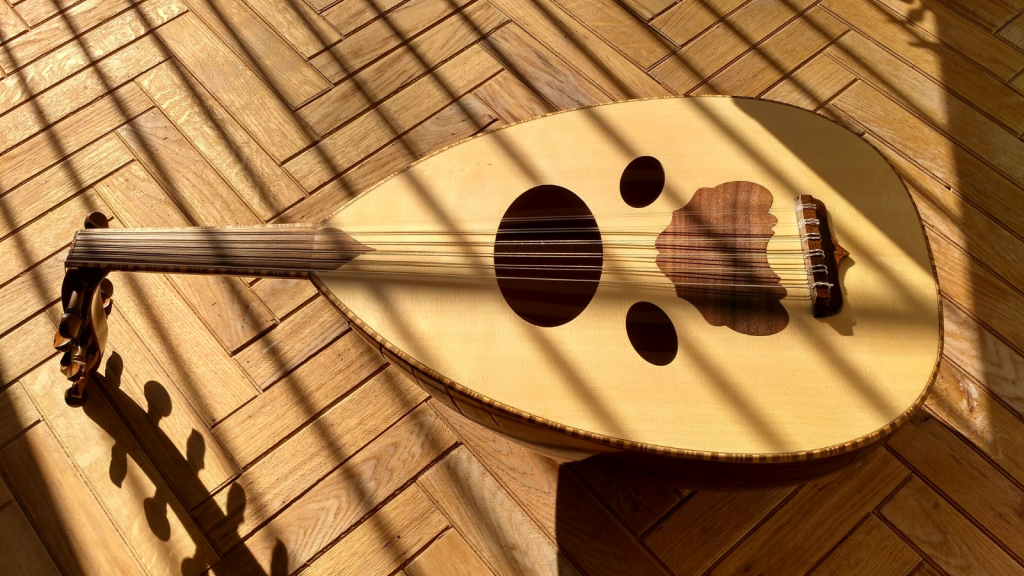
Spring 2022 | Fowziyah Abu Khalid and Moneera Al-Ghadeer Read "Oud" – MQR Sound
العود
فوزية أبو خالد إلى نصير شما/ في العامرية/ غرناطة ٩٩ يَفُزُ زُريابُ يَشهَقُ الخشبُ على رُكبتيهِ كأنَّ كُمثرى سَقَطتْ في حِجره وانَبَجستْ حُوريَّات عَدْنٍ وعُيونُ ماءٍ يَسيْلُ رُب أصابعهِ على الأوتار فيغسِلُ الفراتَ ودجلةَ من عَوادِمِ السياسة ِ وطاعونِ الحروبِ ومَباهج الهَزائمِ يَشُبُّ الشَّجَنُ العراقيُّ في جُبْنِنا الجماعي وَبريشَتهِ يَنحَتُ في دَم المَواويل مَحواً يَمحُو أَلواح البَارحةِ ويَنقُضُ كلَّ سحرٍ لاحقْ ص. ٤.٨-٤.٩ الأعمال الكاملة
Oud1
To Naseer Shamma / in Al-‘Amiriyah / Granada 992
Ziryab is startled
the wood sighs on his knees
as if a pear has fallen
into his lap
nymphs of Eden and springs of water
gush
his fingers’ sap drips
on the strings
it purifies the Euphrates and the Tigris
of politics’ exhaust
and plagues of wars
and the joy of defeats
the Iraqi blues ascend
from our collective cowardice
and the pick
etches oblivion
into the blood of mawāwīl
effacing and
erasing yesterday's panels
and breaking every looming spell
Translated from the Arabic by
Moneera Al-Ghadeer
1 An oud is a stringed instrument akin to the lute.
2 Al-‘Amiriyah is a shelter in Baghdad. On February 13, 1991, United States forces targeted the shelter with an aerial bombing attack, killing more than 400 civilians who were sleeping in the shelter.
Translator’s Note
Fowziyah Abu Khalid’s poem is a mournful melody, but one that resists the traditions of grief and alludes to a life worth living. The poet writes against the politics of rithā—the elegiac genre long deployed in Arab poetics to lament the dead—by distancing her language from the sentiments that typically surround women’s grieving in rithā and using musical references to commemorate the dead. Music is the poem’s central force, evidence of which can be traced from its title, “Oud,” to its powerful visual representations of music and references to well-known modern and classical Arab musicians. The poem positions the classical musician Ziryab in a musical lineage with contemporary Iraqi oud player Naseer Shamma and merges these musical references with mythical allusions to Eden and ancient Iraq, effectively evoking historical narratives about the rise and fall of empires despite the poem’s brevity and subtlety.
In the early stages of translating the poem, I was captivated by its lyrical grandeur and by its metaphors’ delightful rush to inhabit a new space in the other language, but then I was surprised to see the lament taking place in the periphery of what is being articulated. The poet attempts to write about the disaster, only to turn away from the political spectacle of it, deftly averting death itself by utilizing a number of poetic strategies. The tragedy emerges in the margin, in the footnotes, as if the grotesque cannot be fully described and the poem needs to be supplemented as a consequence. In the same vein, the poem’s performative staging shows that the tragedy can be conveyed only by music, indicating a failure of poetry alone to describe or even venture near to the collective death that occurred in Iraq’s Al-‘Amiriyah shelter in 1991. Following the poem’s inability to name loss, I was compelled to amplify more musical references as I translated, and I found plenty of musical word choices to select, even though they make audacious leaps in the English translation.
For more from the Spring 2022 special issue of MQR, “Decades of Fire: New Writing from the Middle East and North Africa,” you can purchase the issue here.







